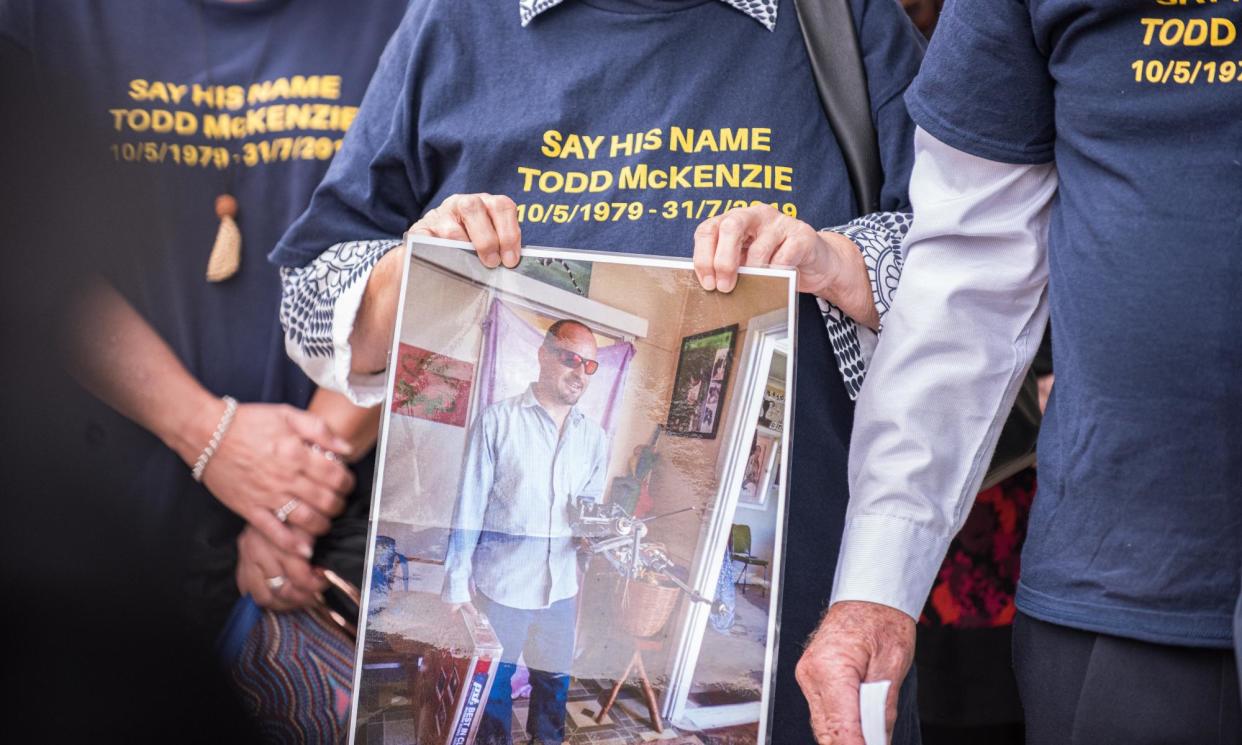Police operation in which NSW man shot dead during psychotic episode was ‘flawed’, inquest finds

A New South Wales police operation that resulted in a man being shot dead by the force while suffering psychosis was significantly “flawed”, an inquest has found.
Todd McKenzie, 40, was suffering from a psychosis when he shot three times by police in his Taree home in 2019 following a nine-hour siege after police responded to reports he was on the street yelling and holding a knife.
The deputy state coroner Harriet Grahame urged the NSW government to hold a summit into how police respond to mental health incidents, saying it was the need for training was a “live issue that needs urgent attention”.
“In my view, it’s time to grapple with these issues in and away from the pain of each individual death, these issues affect the whole community not just the grief that lasts for ever with the death associated with a love one,” Grahame said.
Grahame said she would send the findings to the NSW minister for police, Yasmin Catley, and the minister for mental health, Rose Jackson.
The findings come amid increasing scrutiny on how police respond to mental health related incidents. Last year, Steve Pampalian, Jesse Deacon and Krista Kach were fatally wounded or shot by NSW police between while they were experiencing mental health issues that left them detached from reality.
Related: ‘Such a gentle soul’: family in shock after Sydney man Steve Pampalian shot dead by police
Guardian Australia last year revealed that 52 people experiencing mental health distress died in interactions with the state’s police during the past five years.
McKenzie’s stepfather, Neil Wilkins, told reporters outside the coroner’s court that “no family shouldn’t have to go through what we’ve been through”.
“What Todd needed was medical attention and a kind and gentle word from his family,” Wilkins said. “Instead, he got the full weight of a siege set up by NSW police. They had tunnel vision and wanted to make an arrest – we all know the result: Todd was shot three times and died that night.”
Grahame said one of the “most important facing police” was finding practical ways to improve de-escalation techniques.
“In my view the police operations which ended Todd’s life was flawed in a number of significant respects,” Grahame said.
The flaws included the police “inappropriate” communication with Mckenzie, she said. The inquest revealed a general duty police officer had taunted Mckenzie, who lived with schizophrenia, during his mental health crisis.
During the inquest’s proceedings body cam footage was played which captured the taunts during the siege.
“At the end of the day I’d much rather you come out here with your bloody knife and try [have a] go [at] us all. I’m getting fucking sick of this,” the officer had said to McKenzie. “This entire scenario is your delusion Todd … at the end of the day, basically everything you said was a lie.”
Grahame also said police failed to keep Mckenzie’s family properly “in the loop” or informed” when they declined offers of negotiation support from his family.
“Once tactical police broke the window and rammed the door of Todd’s home, disaster of some kind in my view was almost ensured,” Grahame said of the “breach and hold tactic”, which saw McKenzie run at police with a knife.
Unlike the taunts by the general duty police officer, this was not captured due to tactical police officers not being required in NSW to wear body cams.
Grahame recommended this should change and that tactical officers be required to wear body cameras.
She also recommended a review and audit of police training be undertaken every two years to ensure officers of all ranks undergo adequate and regular training in responding to mental health incidents.
Related: ‘He was on the way up’: mother of NSW police shooting victim demands mental health reform
Her final recommendation was for the NSW police commissioner to “consider” updating the force’s standard operating procedures to include a requirement for a team leader to record considerations of why, as well as why not, a psychiatrist was engaged in a response.
George Newhouse, the chief executive of the National Justice Project, said the group would push for the coroner’s suggestion for a summit.
“I think it’s really important that people understand that people are dying at the hands of police because they are sick, they have an illness,” he said.
Sue Higginson, the NSW Greens spokesperson for justice, said the coroner had taken the “unusual step” of sending the findings to the government.
“Premier Chris Minns needs to step up,” Higginson said. “Police are failing, they need help and we need immediate and drastic action.”


